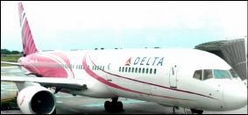Delta levies US$50 bag fee amid losses
Published: Wednesday | April 22, 2009

A Delta plan on the tarmac at Sangster International Airport. - File
Delta Air Lines Inc, the world's biggest airline operator, said Tuesday it will institute a US$50 fee for most passengers to check a second bag on an international flight - a first among major US carriers - as it reported a US$794-million first-quarter loss due to the weak economy and bad bets on fuel hedges.
Company shares soared more than 16 per cent as the results beat Wall Street expectations.
Also, Delta executives said they've seen some signs of revenue stabilisation and the airline still expects to be profitable for the year.
"In short, things aren't good, but they are not getting worse," Delta President Ed Bastian said on a conference call with analysts and reporters.
First-quarter losses
AMR Corp's American Airlines and UAL Corp's United Airlines, which both posted hefty first-quarter losses, said they were studying Delta's new bag fee, but did not immediately announce plans to match it. US Airways Group Inc, which reports its results Thursday, also is looking at Delta's decision, while Continental Airlines Inc, which reports results on Wednesday, declined to comment.
Among foreign carriers, British Airways has a fee for a second checked bag for some passengers for travel to some international destinations.
Bastian said the continued "unbundling of our pricing" is the right thing for the airline to do.
Atlanta-based Delta said its fee was effective Tuesday for travel beginning July 1.
New fee
The company expects to generate more than US$100 million annually from the new fee. Delta already charges fees for the first and second checked bags on domestic flights.
It also said that it will ground 40 to 50 mainline aircraft, including its entire fleet of 14 B747-200 freighters in its cargo unit. Other aircraft to be taken out of its mainline system include some Boeing 757s and MD88s, executives said. In addition, Delta will remove 30 regional jets from service.
The upcoming summer travel season is typically a busy time for airlines. However, the economy has been pressuring advance bookings.
Bastian said Delta's domestic occupancy rate based on advance bookings for May and June is down two to four percentage points year-over-year.
Corporate travel trends remain soft, but the pace of the decline is easing, Bastian said.
Loss in shares
Delta said the loss for the three months ended March 31 was 96 cents a share, and compares with a loss of US$6.39 billion, or US$16.15 a share, for the same period a year ago.
Revenue increased 40 per cent to US$6.68 billion, but that was skewed by Delta's acquisition of Northwest Airlines in October.
In the year-ago quarter, before the acquisition, Delta posted revenue of US$4.77 billion.
Excluding special items, Delta said its first-quarter loss was 84 cents a share. Analysts polled by Thomson Reuters, who generally exclude one-time items from their estimates, expected Delta to post a loss of $1.01 per share for the first quarter on sales of $6.7 billion.
Job cuts
Delta, like other airlines, has been cutting jobs and capacity to weather the global economic downturn.
Delta previously said it will reduce international capacity by 10 per cent beginning in September. As a result, in the December 2009 quarter, Delta expects system capacity to be down six per cent to eight per cent and international capacity to be down 9 per cent to 11 per cent, year-over-year.
Elite frequent fliers and active military are exempt from paying Delta's new fee for a second checked bag on international flights. The first checked bag on international flights remains free.
Delta said it posted US$684 million in realised fuel hedge losses in the first three months of the year. As oil prices soared to US$147 a barrel last July, many airlines hedged a portion of their future fuel needs.
When market prices came tumbling down in the months that followed, some airlines were stuck with those hedges and had to pay higher prices for a portion of their fuel.
Delta ended the quarter with US$5 billion in unrestricted liquidity, which was unchanged from the balance at Dec 31, 2008.
Delta currently expects to end 2009 with US$6 billion to US$6.5 billion in liquidity, down from an earlier projection of roughly US$7 billion.
- AP















